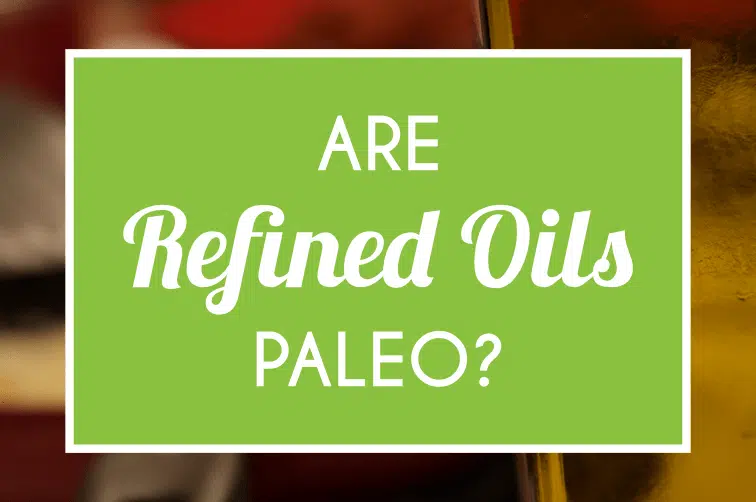Table of Contents
The Quick Answer
No. Refined oils are not paleo.

Why Aren’t Refined Oils Paleo?
Refined oils (usually grape seed oil, almond oil, sunflower oil, canola oil, safflower, and palm fruit oil) are not paleo because to refine an oil, you usually have to destroy the oil’s health-promoting properties and add additives to the oil. Many refined oils come from genetically modified plants and are full of preservatives. On top of this, people living in Paleolithic times did not have the technology to take a crop and turn it into a refined oil.
What Is A Refined Oil?
For most commercial oils to be made, a period of oil extraction and refinement must first occur. Most refined oils found in supermarkets undergo all of the extraction and refinement processes mentioned below, so that they end up with an attractive taste, smell, color, consistency, and shelf life.
Extraction involves getting the oil out of the crop (coconut, olive, soybean, etc.). Extraction usually takes the form of either a highly processed chemical reaction called “chemical extraction” or a less harmful process called “pressing” the oil, which means the crop’s oil is essentially squeezed out using an expeller press or a cold press at low temperatures to prevent the oil from becoming too heated and losing its nutrients.
After an oil is extracted, refinement takes place in order to improve the oil’s appearance, texture, taste, smell, and shelf life. Refinement involves processes like high heating, distilling, filtering, treating the oil with chemicals and solvents, bleaching, dewaxing to remove cloudiness, deodorizing to remove smells, and adding preservatives to increase the oil’s shelf life.
Why Aren’t Refined Oils Paleo?
The refinement process often destroys any healthy qualities that the oil had to begin with and also adds unwanted things like preservatives and solvents to the oil. Furthermore, the majority of refined oils are made from genetically engineered crops. They are also combined with even more chemical solvents. Many of them also have low oxidation points, meaning they become rancid easily when they’re used for cooking. Most also have a bad ratio of omega-6 fats to omega-3 fats. Considering most people’s omega-6 to omega-3 ratio is already imbalanced, this isn’t good news.
Oils that are commonly refined include grape seed oil, almond oil, sunflower oil, canola oil, safflower, and palm fruit oil. Walnut oil, peanut oil, and sesame oil can also be refined. Coconut oil can go either way, so you’ll want to make sure to buy coconut oil that’s marked as “cold-pressed” and “extra virgin”. These labels mean that the oil in question was not heated to such a high temperature that the health benefits offered by the oil were lost. Also look for oils that are organic and non-GMO to ensure you are not consuming harmful pesticides and herbicides.
Is There Any Confusion When It Comes To Refined Oils Being Paleo?
No. For the most part, everyone agrees that these oils are overly processed, devoid of health-promoting properties, and harmful because they are likely to be GMO, they are full of additives, and they oxidize when you cook with them.
So Are Refined Oils Paleo?
No, refined oils are not paleo. While healthy forms of fat are definitely a big, essential part of the paleo diet, and some oils are very good for you, refined oils are not paleo. Paleo followers are much bigger fans of unrefined oils (flaxseed, walnut, olive, macadamia, coconut, and avocado oils). This is especially true when these oils are organic and “cold pressed” or “extra virgin”.
How To Know What Is And Isn’t Paleo
Check out Paleo.io, the mobile app that answers the question, “is __ paleo?” Paleo.io comes with the most comprehensive paleo diet food list out there, so no matter which food you’re confused about, you’ll always be able to find out whether or not it’s paleo.
Photo credit: YoLaGringo